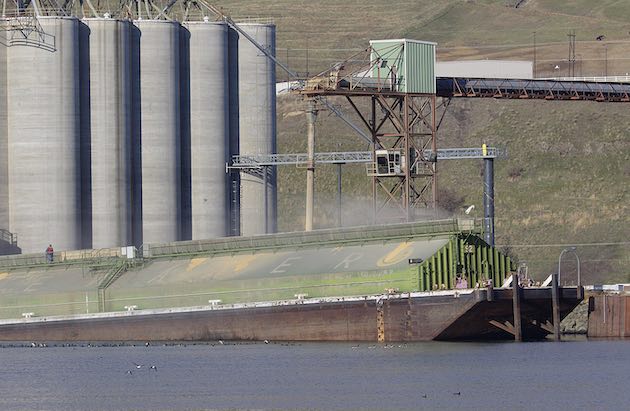forum
library
tutorial
contact

Port of Lewiston
Works to Diversify
by Brad Carlson
Capital Press, December 18, 2018
|
the film forum library tutorial contact |

|
Port of Lewiston
by Brad Carlson
|
 Lewis-Clark Terminal is building a small rail-loading facility at the Port of Lewiston.
Lewis-Clark Terminal is building a small rail-loading facility at the Port of Lewiston.
It's slated for completion by early February.
"It has been a good year," said Scott Zuger, general manager at Lewis-Clark Terminal.
Some facility and market expansion continues at the Port of Lewiston, which has tried to broaden its revenue base since losing oceangoing container business about three years ago. That occurred after container vessels stopped calling on the Port of Portland amid a labor dispute.
"There was definitely a drop in revenue from the loss of container volumes," Port of Lewiston General Manager David Doeringsfeld said. Tonnage exported from the port fell by around 15 percent -- most of it pulse crops -- when the container business stopped.
"The dollar loss was probably, ballpark for just that part of it, about $450,000 in throughput fees," he said. Taking out associated expenses, the net loss was under $200,000.
The port extended a dock to receive sawdust and chip barges headed upstream. Doeringsfeld said that segment now generates nearly $100,000 in revenue, and little expense.
"And we are continuing to work on break-bulk volumes, he said, "bringing equipment manufactured overseas that is brought to a Columbia River port, put on a barge, offloaded here, put on a truck and taken into the interior of the U.S."
For the fiscal year that started July 1, the port's budget is around $1.6 million, down from about $2 million recently, mainly due to a lack of major port-owned construction projects, he said. Oceangoing containers once occupied chunks of a large storage yard. For now, the yard is not vacant all the time. Large, upstream-bound equipment is stored there as needed.
"At this point, we are not converting that area to any other use," Doeringsfeld said. "We are optimistic containers will come back in the future."
Hong Kong-based Swire Shipping early this year began calling on the Port of Portland for container service. Doeringsfeld said this has been a welcome development but does not impact the Port of Lewiston, the West's most inland seaport, because Swire's capacity is minimal compared to total demand -- and thus filled close to Portland.
"It has to get there somehow," said Todd Scholz, vice president of research and member services for the Moscow, Idaho-based USA Dry Pea & Lentil Council.
Peas, lentils and chickpeas from Idaho, Washington and Montana now get to Seattle or Tacoma ports by truck or train.
"It's more expensive and less efficient," Scholz said. "We need the container ships back." The pulse crops are shipped in bags rather than in bulk.
Pacific Northwest (PNW) Farmers Cooperative, Uniontown Cooperative and CHS Primeland own Lewis-Clark Terminal. PNW also leases a Lewis-Clark Terminal facility where it cleans pulse crops; much of that volume is loaded onto boxcars. PNW has a unit train facility, for hauling single types of commodities directly, near Rosalia, Wash.
"I would like to have the oceangoing containers back at Lewiston. That worked well for us," said Sam White, PNW chief financial officer. "But we don't control that, so we are making do other ways."
Zuger said Lewis-Clark Terminal last spring put into service two steel grain tanks each with a capacity of 613,000 bushels, bringing the terminal's storage capacity to more than 10 million bushels. The terminal also upgraded its conveyance system.
The project aimed to increase the efficiency of farmer-to-market connections while enabling Lewis-Clark to handle more grain, faster, he said. Farmers are getting higher yields per acre, and the combine harvesters they use handle more bushels per hour, per day.
"The pace of grain coming into the terminal at harvest time is increased, so we have to be able to receive that grain and store it quickly and efficiently," Zuger said.
The rail-loading facility under construction, expected to handle up to six cars at once, is designed for easy cleaning to accommodate shipments of various commodities. CHS Primeland is losing its rail-loading facility on Snake River Avenue in Lewiston due to a short-line rail closure.
"By having it here at the port and owned by Lewis-Clark Terminal, all three members can work on rail projects and use it," Zuger said.
learn more on topics covered in the film
see the video
read the script
learn the songs
discussion forum
